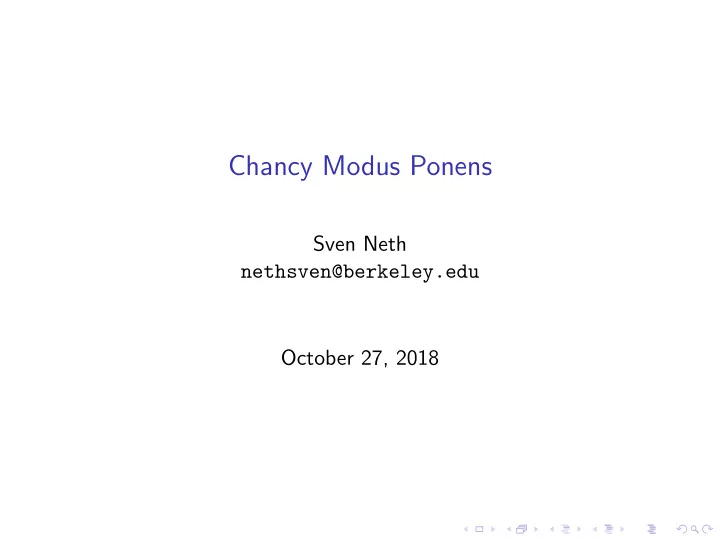

Chancy Modus Ponens Sven Neth nethsven@berkeley.edu October 27, 2018
Outline What is Chancy Modus Ponens? Counterexamples McGee on Modus Ponens Semantics
What is Chancy Modus Ponens? Probably, φ . If φ , then ψ . Therefore, probably ψ . [Yalcin, 2010, Moss, 2015, Moss, 2018]
Counterexamples Horse Race. There’s a horse race with three horses A, B and C. Horse A and C belong to team red, horse B to team blue. Horse A will win with 55% probability, horse B with 30% probability and horse C with 15% probability. (1) Probably, a team red horse wins. (2) If a team red horse wins, then if it’s not horse A who wins the race, it’s horse C. However, the following are false: (3) Probably, if it’s not horse A who wins the race, it’s horse C. (4) If it’s not horse A who wins the race, it’s probably horse C.
Counterexamples Murder. We have evidence that makes it probable but fails to demonstrate ‘beyond reasonable doubt’ that Miss Scarlet is the murderer. (5) Probably, Miss Scarlet is the murderer. (6) If Miss Scarlet is the murderer, she should be convicted (7) Miss Scarlet should not be convicted If Chancy MP were valid, (5) and (6) would entail: (8) Probably, Miss Scarlet should be convicted.
McGee on Modus Ponens “Opinion polls taken just before the 1980 election showed the Republican Ronald Reagan decisively ahead of the Democrat Jimmy Carter, with the other Republican in the race, John Anderson, a distant third. Those apprised of the poll results believed, with good reason: If a Republican wins the election, then if it’s not Reagan who wins it will be Anderson. A Republican will win the election. Yet they did not have reason to believe If it’s not Reagan who wins, it will be Anderson.” [McGee, 1985]
McGee on Modus Ponens “[...] there are occasions on which has good grounds for believing the premises of an application of modus ponens but yet one is not justified in accepting the conclusion.” [McGee, 1985] “Sometimes the conclusion of an application of modus ponens is something we do not believe and should not believe, even though the premises are propositions we believe very properly.” [McGee, 1985]
Semantics The language L : φ := α | ¬ φ | φ ∧ ψ | ∆ φ | φ → ψ. The valuation function � . � w , i maps sentences of L to semantic values relative to a world w and an information state i [MacFarlane, 2011]. Info states are probability spaces � Ω i , F i , P i � , where Ω i is a nonempty set (of epistemically possible worlds), F i is an algebra of subsets of Ω i and P i is a probability measure on F i [Yalcin, 2012].
Semantics [ φ ] i = { w : � φ � w , i = 1 } . Info state i accepts φ if for all w ∈ Ω i , � φ � w , i = 1. Info state i updated with φ , written i φ , is: i φ = � Ω i ∩ [ φ ] i , { X ∈ F : X ∩ [ φ ] i } , P φ i � , where P φ i is P i conditionalized on [ φ ] i . Σ � φ iff every info state which accepts all ψ ∈ Σ also accepts φ .
Semantics � α � w , i = 1 iff w ∈ I ( α ) , � ¬ φ � w , i = 1 iff � φ � w , i = 0 , � φ ∧ ψ � w , i = 1 iff � φ � w , i = � ψ � w , i = 1 , � ∆ φ � w , i = 1 iff P i (Ω i ∩ [ φ ] i ) > . 5 , � φ → ψ � w , i = 1 iff i φ accepts ψ.
Semantics Key results: Modus Ponens is valid: any info state which accepts φ and φ → ψ also accepts ψ . Chancy Modus Ponens is invalid: some info states accept ∆ φ and φ → ψ but don’t accept ∆ ψ . Chancy Modus Ponens is valid in a restricted sense: if ψ does not contain epistemic modals, then any info state which accepts ∆ φ and φ → ψ also accepts ∆ ψ .
Conclusion Chancy Modus Ponens is invalid in general. This explains what’s going on in McGee-style counterexamples to Modus Ponens. Chancy Modus Ponens is valid in a wide range of case, which explains why it seems valid.
References I MacFarlane, J. (2011). Epistemic modals are assessment-sensitive. In Egan, A. and Weatherson, B., editors, Epistemic Modality . Oxford University Press. McGee, V. (1985). A counterexample to modus ponens. Journal of Philosophy , 82(9):462–471. Moss, S. (2015). On the semantics and pragmatics of epistemic vocabulary. Semantics and Pragmatics , 8(5):1–81. Moss, S. (2018). Probabilistic Knowledge . Oxford University Press.
References II Yalcin, S. (2010). Probability operators. Philosophy Compass , 5(11):916–37. Yalcin, S. (2012). A counterexample to modus tollens. Journal of Philosophical Logic , 41(6):1001–1024.
Recommend
More recommend